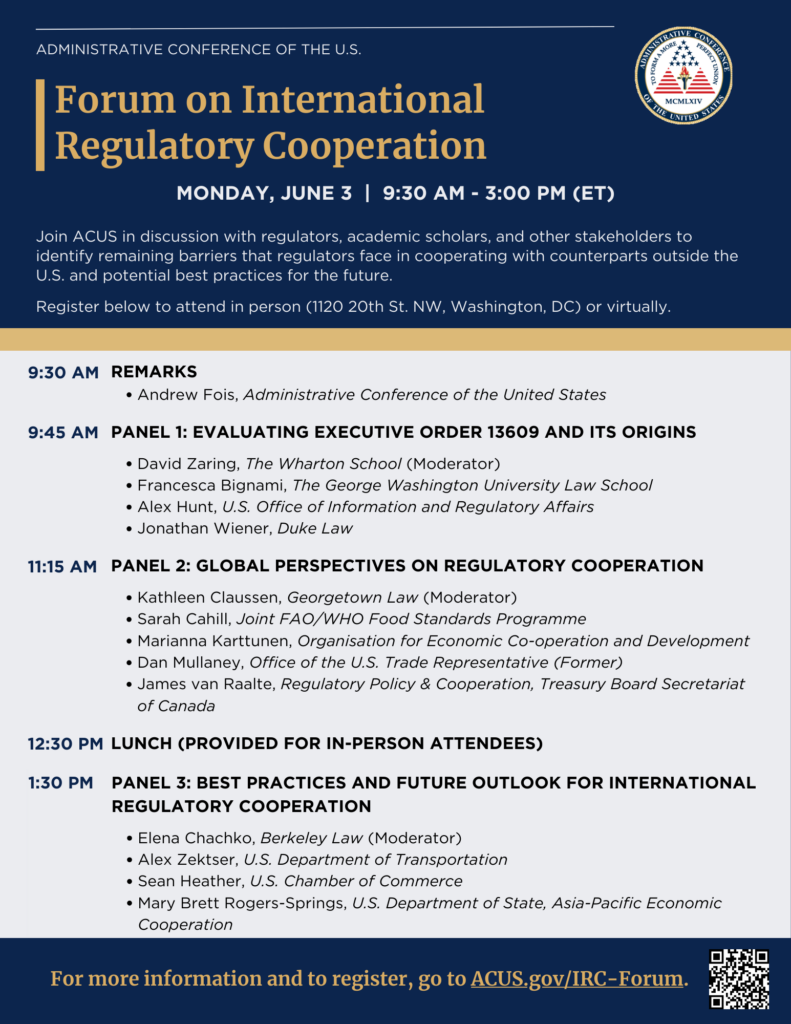ACUS Update: Forum on International Regulatory Cooperation (June 3)
Join the Administrative Conference of the United States (ACUS) on Monday, June 3 (9:30am–3pm ET), for a public forum on international regulatory cooperation.
U.S. and international regulators, leading academic scholars, and other experts in the field will explore the current federal framework for international regulatory cooperation, examine global perspectives, and identify remaining barriers to regulatory cooperation and best practices to guide future policymaking.
The hybrid forum will be held virtually and in-person at the Lafayette Centre Conference Center, 1120 20th St. NW, Building 1 South, Washington, D.C. 20036. Registration is required to attend. Lunch will be provided for registered in-person attendees.
Following opening remarks by ACUS Chair Andrew Fois, attendees will hear from three panels:
Panel 1: Evaluating Executive Order 13609 and Its Origins (9:45am–11am)
In 2012, President Obama issued Executive Order 13609, directing executive branch agencies to consider the potential for international regulatory cooperation when engaged in policymaking. This panel will evaluate how the E.O. came to exist, what efforts towards international regulatory cooperation were like before it was promulgated, and inquire into how agencies received it after promulgation. Speakers on the first panel include:
- David Zaring, The Wharton School (Moderator)
- Francesca Bignami, The George Washington University Law School
- Alex Hunt, U.S. Office of Information and Regulatory Affairs
- Jonathan Wiener, Duke Law
Panel 2: Global Perspectives on Regulatory Cooperation (11:15am–12:30pm)
Executive Order 13609 was issued in the United States at a time when the international community was increasingly engaged in cross-border cooperative efforts, as evidenced by the growth in regulatory exchange among international organizations. This panel will focus on those organizations’ undertakings to complement and amplify national programs, and will evaluate how those undertakings have evolved in the last decade, as well as where work remains. Speakers on the second panel include:
- Kathleen Claussen, Georgetown Law (Moderator)
- Sarah Cahill, Joint FAO/WHO Food Standards Programme
- Marianna Karttunen, Organisation for Economic Co-Operation and Development
- Dan Mullaney, Office of the U.S. Trade Representative (Former)
- James van Raalte, Regulatory Policy & Cooperation, Treasury Board Secretariat of Canada
Panel 3: Best Practices and Future Outlook for International Regulatory Cooperation (1:30pm–2:45pm)
What has Executive Order 13609 helped accomplish to date? How can agency practices be improved upon to better realize the E.O.’s objectives? This panel will take stock of how E.O. 13609 is currently being implemented in the United States and where there is space for more effective implementation. It will consider best practices for individual agencies and across the federal government. Speakers on the third panel include:
- Elena Chachko, Berkeley Law (Moderator)
- Alex Zektser, U.S. Department of Transportation
- Sean Heather, U.S. Chamber of Commerce
- Mary Brett Rogers-Springs, U.S. Department of State, Asia-Pacific Economic Cooperation
To learn more and register to attend, please visit www.acus.gov/irc-forum.

This post is part of the Administrative Conference Update series, which highlights new and continuing projects, upcoming committee meetings, proposed and recently adopted recommendations, and other news about the Administrative Conference of the United States. The series is further explained here, and all prior posts in the series can be found here.
Conrad Dryland is an Attorney Advisor & Special Counsel to the Chair at the Administrative Conference of the United States. Any views expressed belong to the author and do not necessarily represent the views of the Administrative Conference or the federal government.



